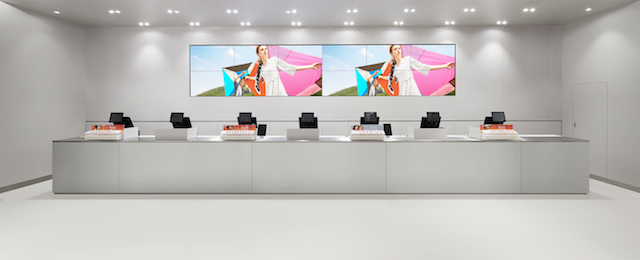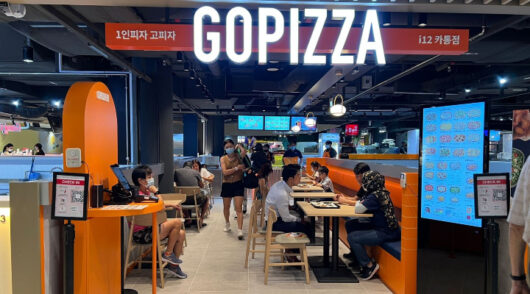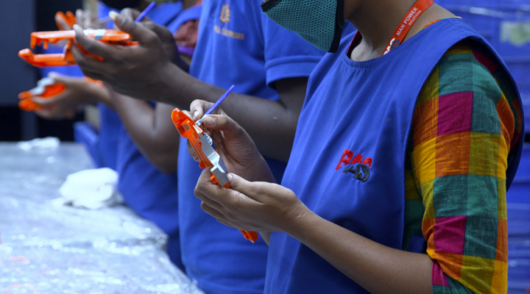As technology increasingly merges online and offline channels, addressing pain points along the purchase journey, a new breed of retail startups is drawing funding from private equity investors.
One of the leaders is Bangkok-headquartered Pomelo, co-founded by Korean-American David Jou.

“Pomelo is a technology company that makes fashion,” Jou tells Inside Retail Asia from his Bangkok operations base.
Before Pomelo was born in 2013, Jou co-founded and served as MD of Lazada Thailand and he has acted as an angel investor in several small startups.
Bangkok in 2013 was already a buzzing creative hub with designers, graphic artists and digitally savvy technology specialists aplenty, a thriving fashion industry and a destination where a growing number of international producers were heading to film movies and television commercials. So Jou sat down with his co-founders and thought: How do we put all of this together and turn it into a business?

“Back then, the core pillars that are required to get the e-commerce market going were just starting to be put into place: logistics, high-speed internet, smartphones, and a social-media infrastructure. And one of the things that was completely devoid in the region was e-commerce,” he recalls.
“That was really the inspiration for Pomelo. We said hey, let’s build a direct-to-consumer fashion brand. And we’re going to use digital, we’re going to use social media, we’re going to use technology to really take out the middleman and make the entire process more efficient. We felt like we really had to create a brand for the digital era. So we started working on the idea and launched to the public at the beginning of 2014.”
In the five years since, Pomelo has grown from a fledgling online-only fashion platform to an omnichannel retailer with a presence in five countries serving customers in more than 50.
In September, the company closed another funding round, securing US$52 million. Investors to date include heavyweights like JD and Thai retail-and-mall conglomerate Central Group who chipped in back in 2017.
Since then, Pomelo has expanded to Singapore, Hong Kong and Malaysia, grown its gross merchandise volume seven-fold, launched nine physical stores in Thailand and a flagship on Singapore’s Orchard Road. The brand has expanded its product offering even further, launching categories like Purpose, an eco-friendly collection and Beet cosmetics.

While on the surface Pomelo appears to be a fashion retailer, its raison d’etre is very firmly in developing technology-driven business models. And so as Pomelo has grown in brand awareness it has earned a reputation in Asia for its relentless experimentation, for thinking outside the traditional norms of the rag trade.

The company’s market-positioning statement is “Fashion born in Asia. On Trend. Online. On The Go”. With K-pop and K-fashion already booming at the time of its launch, Pomelo’s team took inspiration from what was trending on the streets of Seoul. Then they worked on search-engine optimisation, social-media promotions and Facebook to build the brand – “and old-school methods like email”. Recruiting key opinion leaders for live streaming in different markets added further momentum.

Then the brand ventured offline, first with pop-up stores to test the market, then with flagships.
Now, in January 2020, its newest initiative is ‘partner stores’. The company has been building a network of 100 retail outlets in Thailand where people who buy clothing online can have their orders delivered and try them on before taking them home. Or they can return them or order an exchange if the fit is not right, paying for only what they keep. It’s an ingenious solution to one of the biggest pain points in online fashion retailing for vendors: significantly lowering returns which can run as high as 70 per cent in some Asian markets.
Partner stores include cafes, salons, fitness studios, florists and even other clothing stores frequented by its core demographic: females aged 25 to 34.
“Creating the best omnichannel retail experience means integrating our products with customer lifestyles, and the first 35 partner stores in Thailand allowed us to be where our customers live, work and play,” said Jou.
The partner stores pay no sign-on fee – in fact they earn a commission for everything collected from their locations. But they have to meet minimum guidelines, such as customer-friendly environment and a fitting room. The company will start recruiting Singapore partner stores early this year.
A world apart
With a true online-offline approach to business, Pomelo is setting itself aside from traditional fashion brands. Jou believes a critical success factor is that the company approaches customers from the opposite direction to traditional retailers.
“The brick-and-mortar guys have a product or a business model that they’re pushing and the customer kind of comes at the end of that value chain, whereas we are using customer feedback to really drive our future.”
Its business model evolved from listening to customer feedback in the early days when it set out to be on trend.
“We were working with social-media influencers to identify different groups of customers. Then we were designing collections specifically based on their preferences.”
During that process, over and over again the Pomelo team kept getting the same feedback: ‘We love the brand. We love the style. The price is great. But I don’t feel comfortable buying fashion on the internet. If it doesn’t fit me, I don’t want to deal with the hassle of returns’.”
The iteration before partner stores was Pomelo Pickup, where customers could try-before they bought at pop-up stores in Bangkok and Singapore, to their own schedule. The feedback was overwhelmingly positive, says Jou.
This carefully charted course, evolving on listening to customers and solving their problems rather than just churning out high volumes of fast fashion, is clearly what is attracting investors.
“This is a disruptive time for omnichannel in Asia and Pomelo is in a unique position because of its vertically integrated model and innovative technical abilities,” said Michael Aw, founding partner at Provident Growth Fund, one of the investors in the most recent funding round.
“We are confident they will lead the way in fashion across Southeast Asia and beyond. Leveraging its direct-to-consumer fashion technology, Pomelo has proven itself a trailblazer in omnichannel fashion since its launch.”
Jou says Pomelo’s omnichannel strategy is built upon its ability to provide a variety of retail options.
“As a fashion brand with a technology DNA we place the customer experience at the forefront of everything we do.
“Everywhere we look, we see opportunities for innovation to reinvent how things are done to create better products, better serve customers, and maximise omnichannel productivity and efficiency. Fashion is as relevant today as ever and we are excited to chart a unique path forward in an effort to reinvent what it means to be a fashion brand,” he concludes.
This feature originally appeared in the Inside Retail Asia’s magazine edition.






